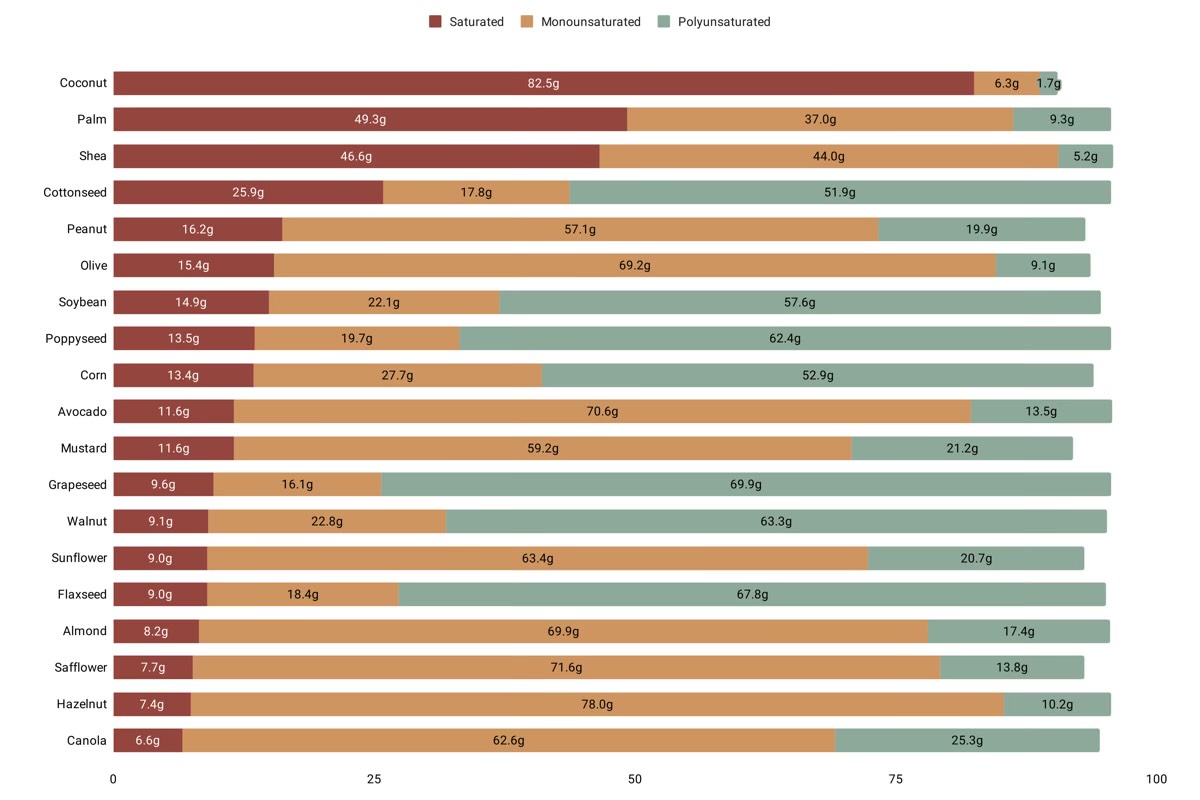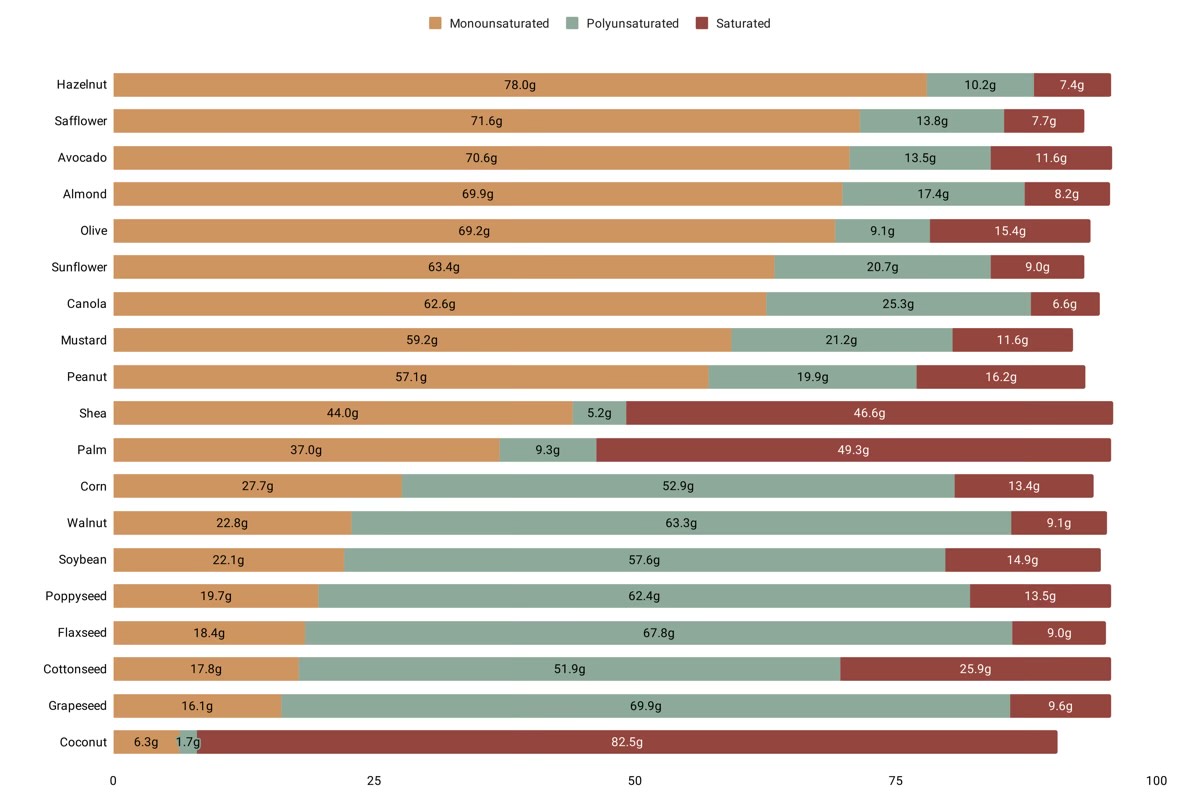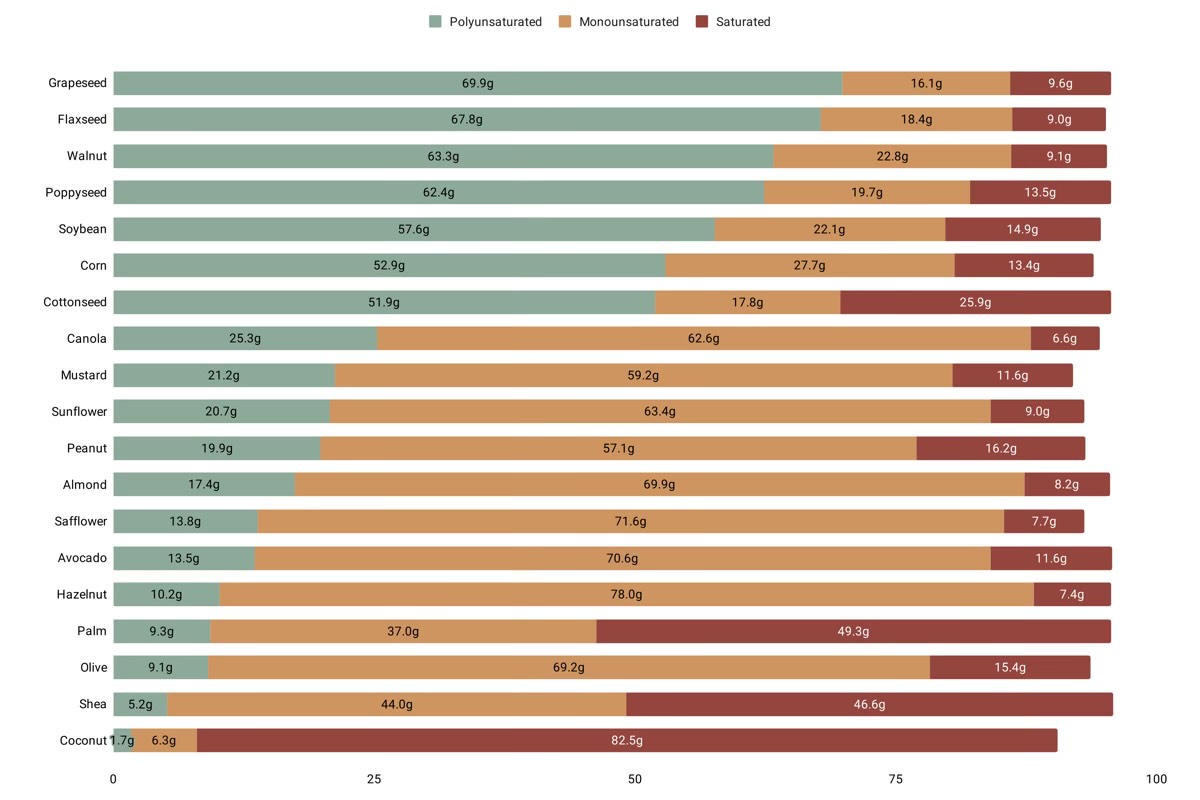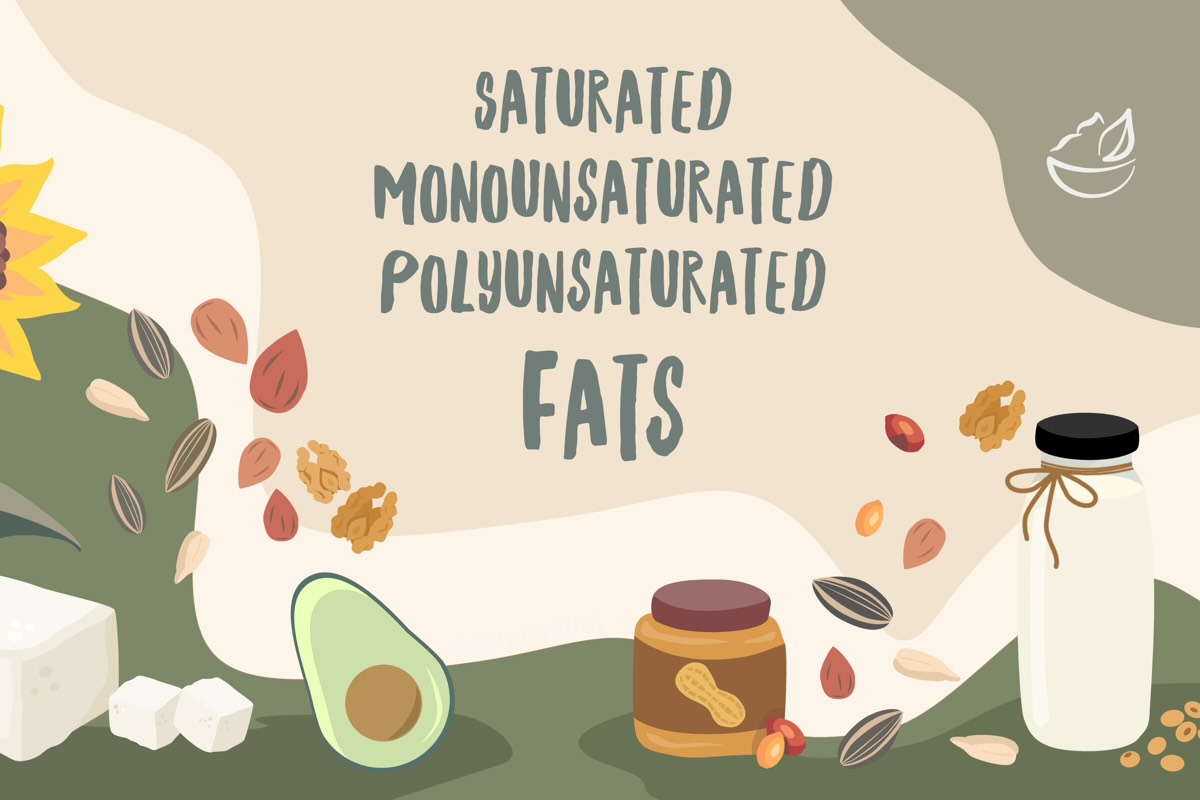Saturated Fats
What are saturated fats? At its core, saturated fat is a type of fat molecule that lacks double bonds between the individual carbon atoms. This unique structure allows the fatty acid chains to pack closely together, resulting in a solid or semi-solid state at room temperature. Common sources of saturated fats include animal products such as meat, dairy, and certain tropical oils.
Saturated fats, a term often tossed around in health discussions, have been under the scrutiny of nutritionists and health experts for their potential impact on cardiovascular health.
Where Did the ‘Saturated Fats = Bad’ Discussion Come From?
Found in various foods, these fats have been linked to an increase in a particular type of cholesterol known as low-density lipoprotein (LDL). LDL cholesterol, often referred to as the “bad” cholesterol, plays a role in the formation of plaque within our arteries, posing a potential risk to heart health.
Not All Saturated Fats Are Created Equal
A crucial point to note is that not all saturated fats behave the same way. Saturated fats from red meat and butter may impact LDL cholesterol more than those from dairy. This variation underscores the importance of being specific about the sources of saturated fats when assessing their potential health effects.
Unraveling the Mechanism: The Role of ApoB and the Liver
Apolipoprotein B (ApoB) is a protein that carries fats, especially LDL cholesterol, in our bloodstream. An excess of ApoB-containing lipoproteins, particularly LDL, can lead to the accumulation of plaque in our arteries. The liver, a central player in cholesterol regulation, can be affected by saturated fats, reducing its ability to clear these lipoproteins efficiently.
Connecting the Dots: Saturated Fats and Cardiovascular Risk
Meta-analyses and studies consistently indicate a positive correlation between saturated fat intake and the risk of coronary heart disease. It’s like a puzzle coming together: saturated fats contributing to elevated LDL cholesterol, which, over time, may lead to an increased risk of heart-related issues.
Genetic Variability: Why One Size Doesn’t Fit All
Adding another layer to the complexity is our genetic makeup. Individuals may respond differently to saturated fats based on their genetics. Some might be more resilient to the adverse effects, while others could be more predisposed to health risks associated with these fats.
Measuring for Precision: The Importance of Health Assessments
To truly understand the impact of saturated fats on an individual level, precise measurements are needed. Assessing ApoB or non-HDL cholesterol provides a more comprehensive view of lipid-related risks, surpassing the limitations of solely relying on LDL cholesterol levels.
Balancing Act: Making Informed Dietary Choices
As we navigate this landscape of saturated fats, the key takeaway is the importance of making informed dietary choices. While saturated fats raise concerns when it comes to our health, we can take control of our diet! Substituting saturated fats with monounsaturated and polyunsaturated fats is known to positively impact cardiovascular health and cholesterol levels.
Start Here
-
Identify Sources of Saturated Fats: Recognize foods high in saturated fats, such as red meat, butter, cheese, and processed foods. Awareness is the first step!
-
Know Your Oils: Swap saturated fat-heavy oils (e.g., coconut or palm oil) and butter with healthier options such as olive oil, avocado oil, or canola oil.
-
Incorporate Leaner Protein Choices: Swap red meat for leaner protein sources like fish, soy products, legumes, nuts, and seeds.
-
Label Reading: Pay attention to food labels and select products lower in saturated fats and trans fats.
-
Limit Processed Foods: Minimize the intake of processed and fried foods, as they often contain high levels of unhealthy saturated fats. Focus on whole, natural foods.
To keep it simple, choosing mostly plant-based whole foods is a fantastic way to go, especially for fats. Whole foods, abundant in essential nutrients and minimal in the unhealthy saturated fats often associated with animal products, present an optimal balance of monounsaturated and polyunsaturated fats, among various other benefits.

Monounsaturated Fats
Monounsaturated fats are a type of unsaturated fat characterized by having one double bond in the fatty acid chain. In contrast to saturated fats, which have no double bonds and are solid at room temperature, monounsaturated fats are typically liquid at room temperature and can solidify when refrigerated. These fats are found in a variety of food sources, including: olive oil, canola oil, peanut oil, safflower oil, avocados, almonds, hazelnuts, pecans, pumpkin and sesame seeds.
Health Advantages of Monounsaturated Fats
Monounsaturated fats are often celebrated for their cardiovascular benefits. They can help reduce bad cholesterol levels (LDL) in your blood, which can lower your risk of heart disease and stroke. Moreover, they also provide nutrients to help develop and maintain your body’s cells. Olive oil, in particular, is rich in the monounsaturated fat known as oleic acid. This fat is associated with inflammation reduction and has been shown to have beneficial effects on genes linked to cancer. Diets high in monounsaturated fats, such as the Mediterranean diet, have been linked to improved heart health and lower mortality rates. Additionally, monounsaturated fats can also help with weight management. They can provide a feeling of fullness after meals, which may reduce overall calorie intake. Furthermore, these fats are also essential for the absorption of fat-soluble vitamins, such as vitamins A, D, E, and K.

Polyunsaturated Fats
Polyunsaturated fats are characterized by the presence of more than one double bond in their fatty acid chains. This structural feature makes them more fluid than saturated fats and monounsaturated fats.
In the realm of nutrition, polyunsaturated fats (PUFAs) hold a unique position due to their complex role in human health. PUFAs are essential fats, which means they are crucial for normal body functions but cannot be synthesized by the human body. Therefore, they must be obtained through diet.
The two main types of PUFAs are omega-3 and omega-6 fatty acids, both of which are vital for health. Omega-3 fatty acids, found in high concentrations in fish oil, flaxseeds, and walnuts, are known for their anti-inflammatory properties. They are crucial for brain function and the development of cell membranes. Omega-6 fatty acids, on the other hand, are abundant in vegetable oils like sunflower, corn, and soybean oil. While also essential, they tend to be pro-inflammatory when consumed in excess.
Health Advantages of Polyunsaturated Fats
The consumption of PUFAs has been associated with numerous health benefits. They are known to improve blood cholesterol levels, which can decrease the risk of heart disease. Specifically, PUFAs can lower low-density lipoprotein (LDL) cholesterol, often referred to as “bad” cholesterol, which is a risk factor for atherosclerosis.
Omega-3 fatty acids, in particular, have been extensively studied for their cardiovascular benefits. They can reduce triglycerides, lower blood pressure slightly, and decrease the risk of arrhythmias, which can lead to sudden cardiac death. Moreover, they have been shown to help in reducing the risk of thrombosis by making the blood less likely to clot.
Beyond heart health, omega-3 fatty acids are also associated with a lower incidence of certain cancers, improved mental health, and a reduced risk of neurodegenerative diseases. They play a role in reducing inflammation, which is a common pathway for many chronic diseases
Health Concerns and Considerations
Despite their benefits, PUFAs can also pose health concerns if not consumed in a balanced manner. The modern Western diet tends to be disproportionately high in omega-6 fatty acids due to the prevalent use of vegetable oils in processed foods. This imbalance can promote inflammation and has been linked to an increased risk of chronic diseases, including obesity, diabetes, and inflammatory conditions.
Another concern with PUFAs is their susceptibility to oxidation due to their multiple double bonds. When PUFAs oxidize, they can form harmful compounds that may contribute to cellular damage and inflammation. This is why it’s important to consume PUFAs in their fresh form and to store oils rich in PUFAs properly to prevent rancidity.





